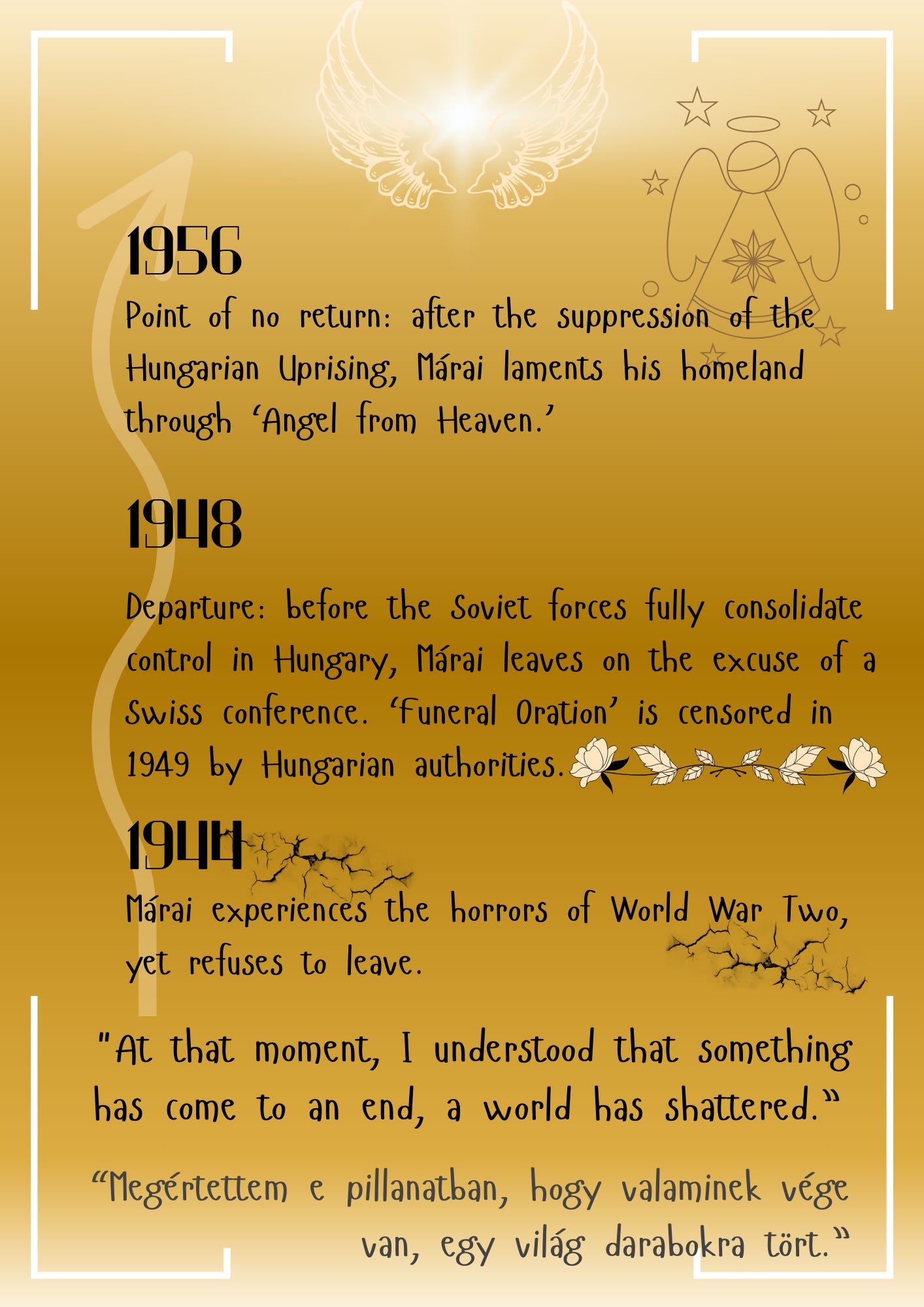Poems of Displacement. Writing Hungary's Soul From Afar. 📖🌍
Listen, Read, Play & learn about Sándor Márai's arty refugee experience 🎮
Click here to play & learn.
Back Story
“Brethren, you see with your own eyes what we are
We are dust and ashes.
Like moth-eaten cloth our memories tear to tatters.
Can you ever put Margaret Island back together?” (Márai, 2013: p. 175)
The quotation above is the opening of ‘Halotti beszéd’ (‘Funeral Oration’). Sándor Márai wrote this piece in 1949 while exiled in Italy. But how did he get here – and what happened in 1956 that made him write a poem even more sorrowful?
Sándor Márai is no stranger to displacement. In his early youth, he traveled voluntarily: he studied in Leipzig, Berlin, and Paris, happily joined by Lola, the woman who would remain his wife for 62 years. However, after Paris a return home was impossible. Márai was born in Kassa (today Košice), a town annexed from Hungary by the Treaty of Trianon and given to Czechoslovakia. Unable to return to the place where he ‘began and here, too I may end’ (Márai, 2013: p. 215), he moved to Budapest in 1928. Even though he did not manage to integrate seamlessly into Budapest polite society, he was highly productive between 1930 and 1942. He wrote poetry and fiction aside from his journalistic work.
Then, German forces invaded Hungary in March 1944. Even though Márai was only a political opponent (therefore not a primary target), his life was intertwined with Lola and her family due to their Jewish heritage. After the deportation and imminent death of Lola’s parents, the couple hid out in Leányfalu. There, they took in and later adopted a four-year-old boy who wandered to their house, orphaned. In the Second World War, the Márais lost their flat in Buda, including the husband’s collection of literature. Echoes of this destruction can be found in his Impressions of an Exiled Hungarian Writer I wherein he laments the ‘ruined state’ of the ‘world’ immediately after the war. His 1945 collection, Book of Verses carries these resonances too. He mournfully commemorates how the ‘world’s already far away, the dread / Shrieks of the war, the whistling sounds of lead’ (Márai, 2013: p. 147). What is most striking, however, is his refusal to leave the country: in 1944 he was offered a supposed escape route to Cairo, but he insisted on staying in his homeland. I say ‘supposed escape route’ because the flight was actually headed to a concentration camp in Mauthausen.
An entry from his 1948 Diary is all the more surprising in the face of his previous commitment to Hungary. He writes, ‘My role at home terminated, my work lost its meaning. Until this country is a Soviet satellite-state and the bounty of the greedy and cruel raid led by domestic Bolsheviks, the Hungarian author cannot justify this high treason by staying here.’ (Márai, 2016: p. 10, my translation). He adds that even though he possessed the ‘right’ to leave, he still experienced this journey as ‘the greatest pain’ as though he was ‘suffocating, like other people do having lost someone or broken up with a destined lover’ (Márai, 2016: p. 11). He was among the last ones to exit the country before the borders shut.
He managed to escape communist Hungary before the country became truly dangerous for him. Soviet control, and the complicit domestic government, enforced compliance with Marxist-Leninism in mass media, and would censor all material that is not aligned to a socialist ideology. ‘Funeral Oration’, the poem mentioned above, was the first one of Márai’s works and gained traction across Europe. When this piece reached Hungary, it was suppressed by communist authorities or was used as propaganda. Mentioning Márai’s name would have ended in repercussions otherwise. Some printers distributed the poem with the message that Hungarians (workers, most importantly) are the happiest at home, in the Soviet bloc, not in the West. Authorities used themes of longing and homesickness in ‘Funeral Oration’ to denigrate migration to the West, but conveniently ignored themes of destruction linked to the Communist regime.
Márai’s poem is homesick indeed. His primary fear is the loss, or perceived deterioration, of his native tongue: ‘Already, all is odds and ends, threadbare, encumbered […] Our language also frays, tatters, its dearest words / Crumble to dust, dry up in the mouth, withered’ (Márai, 2013: p. 175) This feeling of despair speaks to the Hungarian diaspora. These communities, dispersed, found it very difficult to connect with each other, and speak their native language regularly. However, the most heartbreaking feature of the poem is the awareness that Márai is unable to return; unable to connect with his homeland and native culture.
The opening and closing lines (echoed, to create a frame structure) are derived from the oldest extant Hungarian text. The closing lines also paraphrase another prolific Hungarian author, Mihály Vörösmarty, ‘our nerves dry up; our blood as dry as our brains are.’ Márai clearly fosters a strong link between his writing and literary figures of the past: but since these do not propagate a strictly socialist value system, his work did not gain traction in Hungary. Indeed, had he returned, he would have been classified as a ‘class enemy’ – in the 1950s, around 93 percent of prisoners were classified and detained as such (Kahl: 2013, p. 51). With the socialist context in mind, the elegiac tone of the poem speaks to Márai’s sense of grief towards the restricted freedom of expression in Hungary under the communist regime.
‘Funeral Oration’ is only one of the famous examples where Márai brings Hungarian canonical texts from the past into his present poetry. ‘Mennyből az angyal’ (‘Angel from Heaven’) refers to the incredibly widespread and well-known Christmas Carol with the same title. He wrote this poem after the Hungarian Uprising of 1956 was defeated by Soviet forces – that autumn he almost returned home, but the Soviet violence forced him towards the West once again. In the poem he subverts the meaning of the original song, since Márai’s ‘Angel’ is not a messiah filled with hope. He instructs his angel to ‘Go in Haste’ (as the subtitle says):
‘To charred and freezing Budapest.
There, amid the Russian tanks
No bells are tolling out in thanks
Where Christmas doesn’t sparkle now,
No golden walnuts deck the bough,
Nothing but cold and shivering hunger.
Teach them to comprehend their anger.
Speak it aloud out of the night:
Angel, report a miraculous sight.’ (Márai, 2013: p. 179)
This stanza encompasses the economic depravity under Soviet control on the one hand, but on the other it speaks to the Hungarian experience of hopelessness. Both of these themes are especially tragic in a Christmas setting, where miracles and abundance ought to take centre-stage. Such emotions were censored in communist Hungary: once again, in the Impressions of an Exiled Hungarian Writer I, Márai notes that ‘marxist literary supervisors’ demanded ‘optimism’ about the state, not criticism or the reality of struggling classes (Márai, 2016: p. 80). However, as his correspondence in 1954 affirms, Márai was accustomed to hearing nothing but ‘news of violence and destruction’ (Márai, 2016: p. 43).
The angel figure Márai prays to in ‘Angel from Heaven’ is a false figure in a way: Márai expects ‘miracles’ from the angel rather than practical guidance. There is a degree of optimism in the line, ‘New life will always spring from blood’ but this ‘new life’ could have only arisen if the Hungarian revolutionaries in 1956 were not suppressed by Soviet forces.
After the revolution failed, Sándor Márai did not consider returning to his homeland. Even his works were only reprinted in Hungary after his death. Following the failed revolution, he returned to New York, then Italy, and settled in San Diego in 1979 for ten years until he took his own life – he did not live to see the regime change in Hungary in 1991. In his later poetry he still shows signs of homesickness, a commitment to his mother tongue, but all caught up under the burdens of a life in exile.
Bibliography
Ferguson, Denise P., ‘From Communist Control to Glasnost and Back?: Media Freedom and
Control in the Former Soviet Union’ Public Relations Review, 24:2 (1998), pp.165-182.
Kahl, Thede ‘Communist Terror in 1956 and the Rule of Law’ Hungarian Review, 1 (April 2013), pp. 49-62.
Márai, Sándor Memoir of Hungary: 1944-1948, trans. and ed. by Albert Tezla (Budapest: Corvina Books Ltd., 2005 [1996]).
Márai, Sándor, The Withering World, ed. and trans. by John M. Ridland and Peter V. Czipott (London: Alma Books, 2013).
Márai, Sándor, A forradalom előérzete: Márai Sándor és 1956, ed. by Tibor Mészáros (Budapest: Helikon, 2016).
Neubauer, John, ‘Exile: Home of the Twentieth Century’ in The Exile and Return of Writers from East-Central Europe: A Compendium, ed. by John Neubauer and Borbála Zsuzsanna Török (New York: Walter de Gruyter, 2009), pp. 4-107.
Szakolczai, Árpád, Post-Truth Society: A Political Anthropology of Trickster Logic.
In this post Ivett highlights the arty refugee experience of Sándor Márai. She is a citizen journalist on a placement with us organised by Oxford University Career Services. She also organised the micro game to make the journalistic experience interactive.
Thank you for reading an A4R 🎨 Post. Don’t forget to visit our gift shop here. Every purchase scales our impact and pays our bills.





